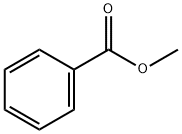Methyl benzoate , 99% , 93-58-3
Synonym(s):
Methyl benzoate
CAS NO.:93-58-3
Empirical Formula: C8H8O2
Molecular Weight: 136.15
MDL number: MFCD00008421
EINECS: 202-259-7
PRODUCT Properties
| Melting point: | -12 °C (lit.) |
| Boiling point: | 198-199 °C (lit.) |
| Density | 1.088 g/mL at 20 °C (lit.) |
| vapor density | 4.68 (vs air) |
| vapor pressure | <1 mm Hg ( 20 °C) |
| refractive index | n |
| FEMA | 2683 | METHYL BENZOATE |
| Flash point: | 181 °F |
| storage temp. | Store at +5°C to +30°C. |
| solubility | ethanol: soluble60%, clear (1mL/4ml) |
| form | Liquid |
| color | Clear colorless to pale yellow |
| Specific Gravity | 1.087~1.095 (20℃) |
| Odor | at 1.00 % in dipropylene glycol. phenolic wintergreen almond floral cananga |
| Odor Type | phenolic |
| biological source | synthetic |
| explosive limit | 8.6-20%(V) |
| Water Solubility | <0.1 g/100 mL at 22.5 ºC |
| Merck | 14,6024 |
| JECFA Number | 851 |
| BRN | 1072099 |
| Dielectric constant | 6.6(20℃) |
| Stability: | Stable. Combustible. Incompatible with strong oxidizing agents, strong acids, strong bases. |
| LogP | 2.12-2.2 at 20℃ |
| CAS DataBase Reference | 93-58-3(CAS DataBase Reference) |
| NIST Chemistry Reference | Benzoic acid, methyl ester(93-58-3) |
| EPA Substance Registry System | Methyl benzoate (93-58-3) |
Description and Uses
Methyl benzoate is an organic compound. It is an ester with the chemical formula C6H5CO2CH3. It is a colorless liquid that is poorly soluble in water, but miscible with organic solvents. Methyl benzoate has a pleasant smell, strongly reminiscent of the fruit of the feijoa tree, and it is used in perfumery. It also finds use as a solvent and as a pesticide used to attract insects such as orchid bees.
Methyl benzoate is used in perfumery. It also finds use as a solvent. It acts as an intermediate and odor agents. Further, it is used to attract insects such as orchid bees. It is also used for cellulose esters, cellulose ethers, synthetic resin and rubber solvent and polyester fibers to assist in the preparation of flavor.
Safety
| Symbol(GHS) |  GHS07 |
| Signal word | Warning |
| Hazard statements | H302 |
| Precautionary statements | P264-P270-P301+P312-P501 |
| Hazard Codes | Xn |
| Risk Statements | 22 |
| Safety Statements | 36 |
| RIDADR | UN 2938 |
| WGK Germany | 1 |
| RTECS | DH3850000 |
| Autoignition Temperature | 510 °C |
| TSCA | Yes |
| HS Code | 29163100 |
| Hazardous Substances Data | 93-58-3(Hazardous Substances Data) |
| Toxicity | LD50 orally in rats: 3.43 g/kg (Smyth) |


